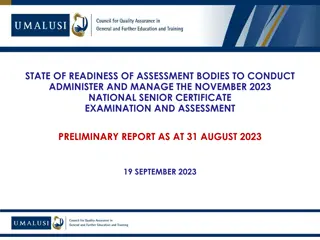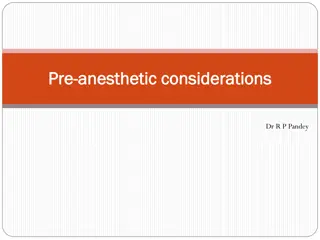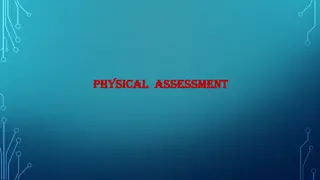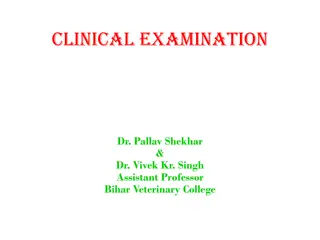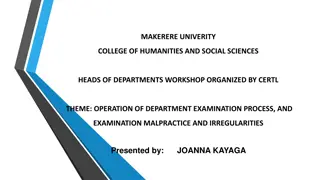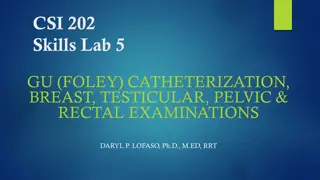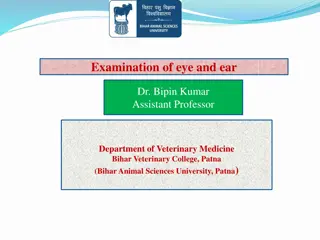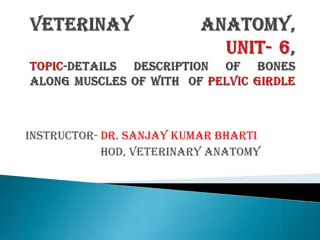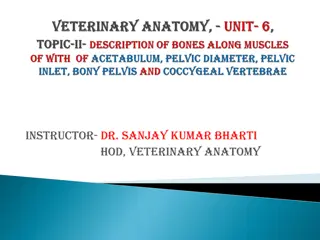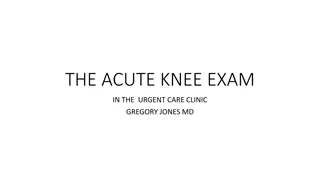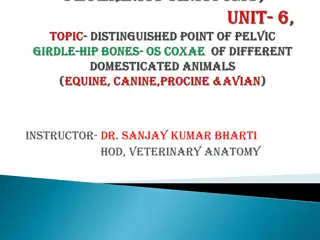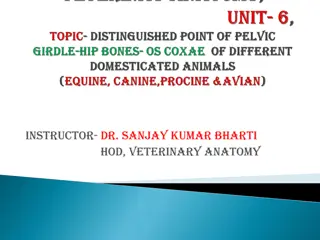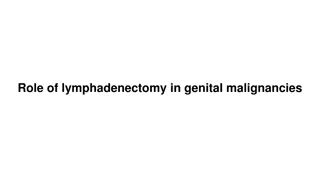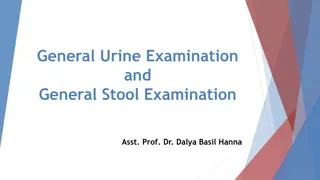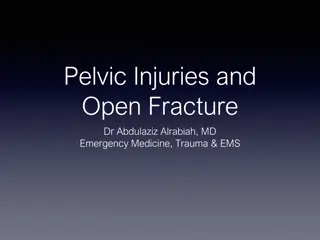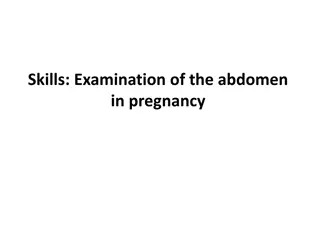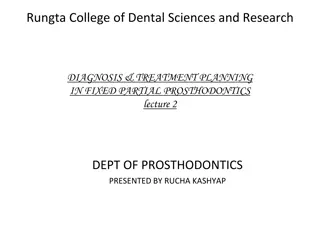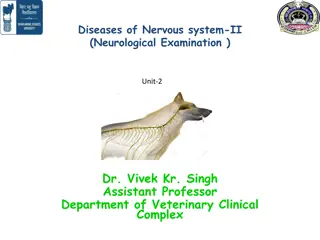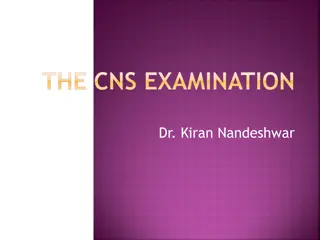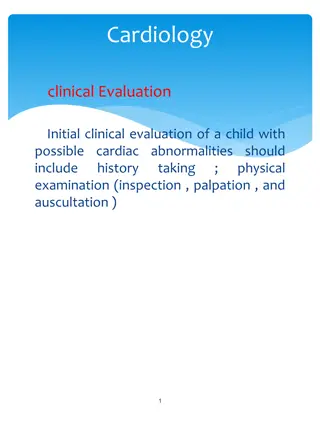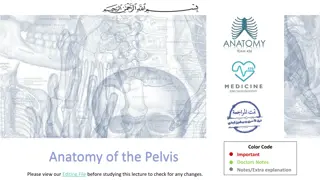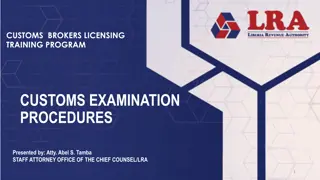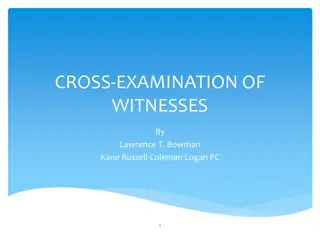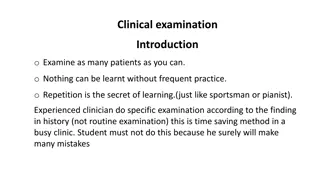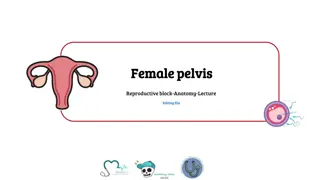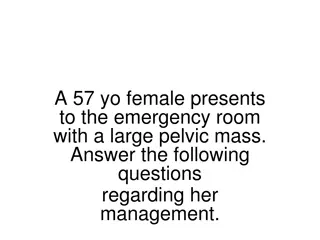Roles of Stakeholders in Examination Process at Benue State University
The examination process at Benue State University involves various stakeholders such as lecturers, invigilators, departmental examination officers, and more. Effective coordination and management of examinations by these stakeholders are crucial for success, credibility, and integrity. Clear guideli
3 views • 20 slides
Autonomous Software Excellence: Transforming Assessments with vmedulife
Effortlessly manage examination data for autonomous institutes with vmedulife\u2019s Autonomous Software module. From seamless examination scheduling to question paper generation, student enrollment, and efficient handling of pre and post-examination tasks, our system streamlines the entire process
3 views • 5 slides
State of Readiness of Assessment Bodies for November 2023 National Senior Certificate Examination
Umalusi conducts an audit to assess the readiness of assessment bodies to manage the November 2023 National Senior Certificate Examination. The preliminary report outlines the approach, findings, and upcoming activities. The audit ensures compliance with quality assurance requirements and identifies
3 views • 55 slides
Anesthetic Considerations and Clinical Examination in Veterinary Practice
Anesthetizing animals requires careful considerations, such as evaluating the route/method of drug administration, general pre-anesthetic considerations, and conducting a thorough clinical examination. Understanding the effects of drug administration routes, patient evaluation, and clinical examinat
0 views • 11 slides
Group-II Combined Civil Service Examination-II Eligibility
The TNPSC Combined Civil Service Examination-II (CCEII) is held to select candidates for TNPSC civil services and TNPSC Group-II exams.\n\nRead more: \/\/obcrights.org\/blog\/jobs\/government-jobs\/state\/tamil-nadu\/tnpsc\/group-2\/tnpsc-group-combined-civil-service-examination-ii-group-ii-tnpsc\/
1 views • 5 slides
Waterbeach Community Forum Updates and Examination Progress
The Waterbeach Community Forum on Wednesday, March 20, 2024, discussed important topics such as the ongoing examination of the CWWTPRP, upcoming hearings, and local diversions during construction. The examination process, including hearings on visual impacts, traffic, and access restrictions, involv
0 views • 6 slides
Understanding Physical Examination: Importance and Purpose
Physical examination plays a crucial role in assessing a patient's physical and mental well-being, detecting diseases early, and establishing a good doctor-patient relationship. It involves systematically collecting objective information through examination techniques. The examination helps identify
2 views • 34 slides
Mastering Cross Examination Techniques for Attorneys
Learn how to script effective cross-examination questions, turn witness statements into probing inquiries, watch your phrasing, use transitions smoothly between questions, and prepare outlines for impeachments. Enhance your cross-examination skills to extract crucial testimony from witnesses in lega
8 views • 9 slides
Veterinary Clinical Examination Techniques and Procedures
Learn about the essential veterinary clinical examination techniques including distant examination (inspection), physical examination (palpation, percussion), auscultation, and more. Understand the importance of visual observation, hands-on assessment, and listening to internal organ sounds in diagn
5 views • 24 slides
Academic Department Management Workshop on Examination Processes and Irregularities
The workshop organized by Makerere University's College of Humanities and Social Sciences focuses on the operation of department examination processes, handling examination malpractices, and ensuring academic integrity. It covers themes such as student orientation, liaison, department operations, an
0 views • 10 slides
Clinical Skills Lab: Foley Catheterization, Breast & Pelvic Examinations
This informative content covers topics such as urethral catheterization, indications for catheterization, anatomic landmarks, male and female catheterization techniques, nosocomial UTIs, pelvic and breast examinations, breast cancer screening recommendations, and breast cancer statistics. It is a co
1 views • 17 slides
Objective Structured Clinical Examination (OSCE): A Modern Approach to Assessing Clinical Competence
The Objective Structured Clinical Examination (OSCE) is a modern examination method widely used in the field of health science to evaluate clinical skill performance. It involves stations where medical students interact with simulated patients to demonstrate competencies such as history taking, phys
1 views • 40 slides
Comprehensive Guide to Ophthalmic Examination in Veterinary Medicine
A detailed guide on the ophthalmic examination of animals led by Dr. Bipin Kumar, Assistant Professor at the Bihar Veterinary College. The examination covers history taking, general physical examination, evaluation of vision, pupil function, eyelid function, adnexal and anterior segment examination,
1 views • 9 slides
Understanding Pelvic Limb Anatomy: Bones and Muscles Overview
Bones and muscles of the pelvic limb, including the pelvis, thigh, leg, and foot, are detailed in this informative content. It covers the general designations of pelvic bones, descriptions of bones along with muscle attachments in various animals, and specifics about the hip bone structure and forma
1 views • 15 slides
Veterinary Anatomy Overview: Pelvic Cavity and Bony Pelvis Structures
The instructor, Dr. Sanjay Kumar Bharti, explains the acetabulum, obturator foramen, sexual differences, and characteristics of sheep and goats related to pelvic anatomy. Details include the structure of the acetabulum, the large obturator foramen, pelvic cavity, and differences between male and fem
2 views • 18 slides
Comprehensive Guide to Acute Knee Examination in Urgent Care
This detailed guide covers the essential components of the acute knee exam conducted in an urgent care setting by Dr. Gregory Jones, including chief complaints, anatomy, examination techniques, ligament assessments, practical aspects, and more. The examination process involves assessing functional l
1 views • 27 slides
Newborn Infant Physical Examination (NIPE) and Neonatal Checks Overview
Essential information on the NIPE screening update, neonatal checks, learning outcomes, eye examination, heart and CVS examination, and hips assessment for newborns. This content emphasizes early identification of abnormalities, top-to-toe examination, referral guidelines, and critical assessments t
0 views • 11 slides
Veterinary Anatomy: Pelvic Structures and Sexual Dimorphism in Animals
The article discusses the anatomy of the acetabulum, obturator foramen, pelvic cavity, pelvic inlet and outlet, and sexual differences in the pelvis, with a focus on sheep and goats. It covers the structure of these pelvic components and highlights the variations between male and female anatomies. D
0 views • 19 slides
Understanding Pelvic Anatomy in Veterinary Science
In this educational content, we delve into the intricate details of acetabulum, obturator foramen, pelvic cavity, pelvic inlet and outlet, sexual differences, and anatomical variations in sheep and goats. The explanations are accompanied by informative images to aid in better comprehension.
0 views • 19 slides
Examination of Witnesses under Indian Evidence Act, 1872
Chapter X of Part III of the Indian Evidence Act, 1872, outlines the process of examining witnesses, including the order of production and admissibility of evidence. Sections 135 to 141 delve into the rules governing the examination-in-chief, cross-examination, and re-examination of witnesses, empha
2 views • 8 slides
Understanding Urinary Retention: Causes, Symptoms, and Management
Urinary retention can be acute or chronic, resulting in the painful inability to void or fully empty the bladder. In men, common causes include benign prostatic enlargement and post-surgery complications, while women may experience it due to pelvic prolapse or neurological issues. Initial management
4 views • 13 slides
Role of Lymphadenectomy in Genital Malignancies
Pelvic and paraaortic lymph node evaluation is crucial in the surgical staging of gynecological malignancies. The goals of lymph node dissection are to determine disease extent and guide further treatment. Pelvic lymph nodes include common iliac, external and internal iliac, obturator, sacral, and p
0 views • 16 slides
Understanding General Urine Examination and Stool Examination
General urine examination involves analyzing the color, clarity, and chemical composition of urine, providing insights into various health conditions and potential issues. It helps in detecting metabolic disorders, kidney diseases, and drug abuse. Additionally, the general stool examination is essen
0 views • 37 slides
Insights on Pelvic Injuries, Open Fractures, and Young Classification in Trauma Care
Explore the expertise of Dr. Abdulaziz Alrabiah, MD in Emergency Medicine, Trauma & EMS through detailed images and descriptions of pelvic injuries, open fractures, and the Young Classification system. Enhance your knowledge on these critical aspects of trauma management.
0 views • 5 slides
Abdominal Examination in Pregnancy: Techniques and Objectives
Examination of the abdomen in pregnancy involves assessing various aspects such as determining gestational age, measuring symphysis-fundus height, evaluating fetal lie and presentation, checking liquor amount, listening to fetal heart sounds, and monitoring fetal movements. The process includes gene
0 views • 38 slides
Understanding Pelvic Ultrasonography: A Comprehensive Guide
Explore the detailed anatomy and variations of the uterus, ovaries, fallopian tubes, and adnexa in pelvic ultrasonography. Learn about the different shapes and sizes of the uterus, layers of the uterine wall, and indications for pelvic ultrasound examination. Discover the significance of the appeara
1 views • 18 slides
Comprehensive Approach to Fixed Partial Prosthodontics Diagnosis and Treatment Planning
This lecture covers the essentials of diagnosis and treatment planning in fixed partial prosthodontics, focusing on recording case history, intraoral examination, and formulating treatment plans. Topics include oral examination, assessment of teeth, occlusal examination, periodontal examination, and
0 views • 25 slides
Comprehensive Guide to Neurological Examination in Dogs and Cats
Neurological examination in dogs and cats is crucial for diagnosing nervous system disorders. This guide covers the recording of history, general and detailed clinical examinations, examination of CSF, radiographic examination, EEG, and brain biopsy. It includes assessing history, mental state, move
0 views • 20 slides
Comprehensive CNS Examination Guidelines by Dr. Kiran Nandeshwar
Detailed guidelines for performing a thorough examination of the central nervous system (CNS) covering general examination, higher function assessment, Glasgow Coma Scale, cranial nerves examination, and motor system evaluation. Includes visual aids for each aspect of the examination process.
0 views • 24 slides
Physiotherapy Support for Mothers with OASI - Expert Guidance and Rehabilitation
Providing specialized physiotherapy support for mothers experiencing Obstetric Anal Sphincter Injuries (OASI) is crucial for addressing immediate problems like pain, urinary or fecal incontinence, and more. With a focus on pelvic health, this approach involves reassurance, tailored pelvic floor musc
0 views • 12 slides
Comprehensive Clinical Evaluation of Children with Cardiac Abnormalities
Initial clinical evaluation of a child with possible cardiac abnormalities includes history taking and physical examination. History should cover symptoms related to pulmonary and systemic venous congestion, cyanosis, cyanotic spells, palpitations, chest pain, and more. The general physical examinat
0 views • 65 slides
Understanding Pelvic Anatomy: Bones, Joints, and Muscles
Explore the comprehensive overview of the anatomy of the pelvis, including its walls, bones, joints, muscles, and differentiations between male and female pelves. Learn about the boundaries, subdivisions, and pelvic floor components, as well as the arterial, nerve, lymph, and venous supplies. Delve
0 views • 27 slides
Understanding Occipito-Posterior Position of the Fetal Head
Occipito-posterior position of the fetal head occurs when the head is in one of the oblique diameters with the occiput directed posteriorly. It can be categorized into Right Occipito-Posterior Position (ROP) and Left Occipito-Posterior Position (LOP), affecting 13% of vertex presentations. Causes in
0 views • 32 slides
Customs Brokers Licensing Training Program: Entry and Examination Procedures
This presentation covers the essential aspects of entry and examination procedures for imported goods, detailing the responsibilities of importers, examination stations at customs airports, customs possession of delayed goods, special inspections, and cost implications. It emphasizes the legal requi
0 views • 15 slides
Effective Trial Advocacy: Cross-Examination Strategies by Professor Stephen A. Saltzburg
Enhance your trial advocacy skills with effective cross-examination strategies discussed by Professor Stephen A. Saltzburg at the District Court of the Virgin Islands mid-year conference. Learn techniques such as eliciting favorable information, attacking witness credibility, and conducting multiple
0 views • 41 slides
Mastering Cross-Examination of Witnesses in Legal Settings
Delve into the art of cross-examination with insights from Lawrence T. Bowman and Kane Russell Coleman Logan PC. Explore the power of cross-examination in uncovering truth, the competitive nature of trials, and the distinction between discovery depositions and trial cross-examination. Learn how to e
0 views • 41 slides
Comprehensive Guide to Clinical Examination Techniques
Clinical examination is a crucial aspect of healthcare practice, requiring a balance of skill, practice, and attention to detail. This guide covers the importance of practice, setting up the examination environment, necessary equipment, different examination areas, special examinations, general asse
0 views • 14 slides
Understanding Female Pelvis Anatomy and Differences from Male Pelvis
The female pelvis anatomy lecture covers the pelvic wall, bones, joints, and muscles. It explains the boundaries, subdivisions, and types of female pelvis, along with details on pelvic walls, floor, and diaphragm components. Additionally, it includes information on arterial, nerve, lymph, and venous
0 views • 13 slides
Management of a 57-Year-Old Female with a Pelvic Mass: Assessments and Work-up
A 57-year-old female presents to the emergency room with a large pelvic mass. Detailed history and physical examination are crucial, focusing on risk factors, past medical history, family history, medications, habits, and social factors. Along with vital signs and lymphadenopathy evaluation, a thoro
0 views • 23 slides
Understanding Pelvic Floor Dysfunction and Prolapse in Women
Pelvic floor dysfunction and prolapse are common issues affecting women, impacting their physical and emotional well-being. Surgical treatment may be necessary for symptomatic cases, but a thorough evaluation of symptoms, obstetric history, and other factors is crucial. Addressing precipitating fact
0 views • 72 slides


